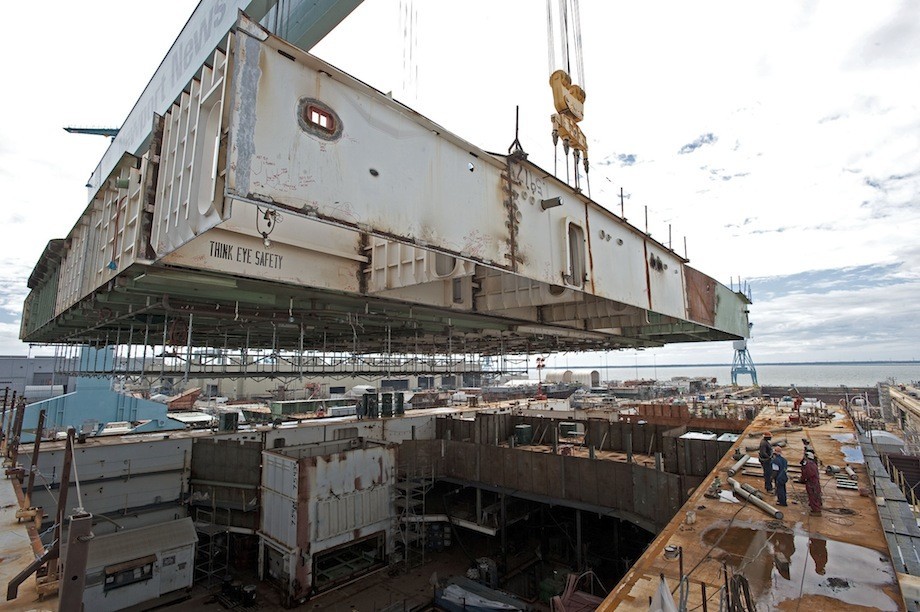Hung Cao – A Navy Diver In The Pentagon Briefing Room
Hung Cao and the Fight to Rebuild America’s Maritime Power Before the Next War Arrives by Captain John Konrad (gCaptain) The first thing you notice about the US Navy’s Undersecretary...

The gallery deck to flight deck bridge assembly was placed on the aircraft carrier Gerald R. Ford (CVN 78) Thursday. The 1,026-metric ton unit is the heaviest that will be moved during the ship’s construction. Photo: HII
Huntington Ingalls Industries set a new “personal best” last week when its Newport News Shipbuilding (NNS) division placed a 1,026-metric ton unit — roughly the weight of six Boeing 747 commercial airplanes — onto the nuclear-powered aircraft carrier Gerald R. Ford ( CVN 78), marking the largest lift ever completed by the shipbuilder.
“This is the heaviest unit to be moved during the ship’s construction and the largest lift our crane has ever made,” said Rolf Bartschi, NNS’ vice president of CVN 78 carrier construction. “This lift represents the strategic construction improvements of the Ford-class carriers. The concept during design of the ship was to build larger units than were built on the Nimitz-class carriers, resulting in fewer crane lifts to the dry dock. This lift is a significant achievement for our shipbuilding team on this first-of-class ship and reflects the pride and capability of the entire team.”
Gerald R. Ford is being built using modular construction, a process where smaller sections of the ship are welded together to form large structural units, outfitting is installed, and the large unit is lifted into the dry dock. Of the nearly 500 total structural lifts needed to complete the ship, 435 have been accomplished. The lifts are accomplished using the shipyard’s 1,050-metric-ton gantry crane, one of the largest in the Western Hemisphere.
At 128 feet wide and 128 feet long, the gallery deck to flight deck bridge assembly comprises 14 steel sections and includes firefighting, jet fuel and catapult systems, jet blast deflectors and electrical servicing stations. Construction of the gallery deck to flight deck bridge assembly began in October 2011.
http://www.youtube.com/watch?v=q4F_JcFZSU4
Gerald R. Ford represents the next-generation class of aircraft carriers. The first-in-class ship features a new nuclear power plant, a redesigned island, electromagnetic catapults, improved weapons movement, an enhanced flight deck capable of increased aircraft sortie rates, and growth margin for future technologies and reduced manning. Ford has been under construction since November 2009. The ship is more than 88 percent structurally complete and is scheduled to launch in 2013 and deliver to the U.S. Navy in 2015.

Sign up for gCaptain’s newsletter and never miss an update

Subscribe to gCaptain Daily and stay informed with the latest global maritime and offshore news
Essential news coupled with the finest maritime content sourced from across the globe.
Sign Up